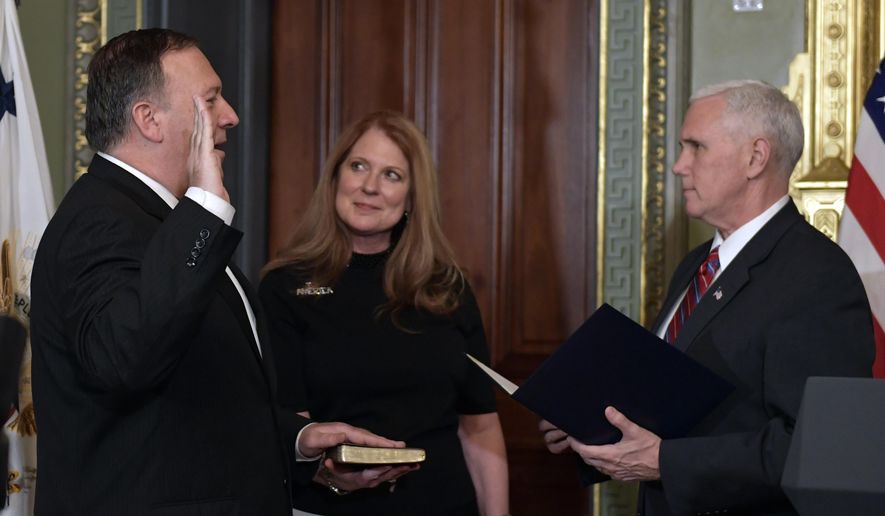The Senate confirmed Mike Pompeo to be the new CIA chief Monday and cleared the way for a vote later this week on Rex Tillerson, President Trump’s pick to lead the State Department, as Republicans pushed through Democrats’ roadblocks.
Mr. Pompeo, a congressman from Kansas, was approved on a 66-32 vote, but only after Democrats forced a three-day delay, demanding more time to complain about his credentials and what they said was a confusing record on civil liberties protections.
“That is why I wanted this debate, wanted us to have the chance to talk about it in the light of day,” said Sen. Ron Wyden, the Oregon Democrat who led the opposition.
But Republican leaders said Mr. Pompeo, a former Army officer who graduated first in his class from West Point, is the right man to chart a path forward for an embattled intelligence community.
“I’m not sure that you can find a glove that fits any better — for the agency, for the Congress of the United States, for the administration, but more importantly for the American people,” said Sen. Richard Burr, chairman of the intelligence committee.
Mr. Tillerson, meanwhile, gained approval of the Senate Foreign Relations Committee on a party-line 11-10 vote, presaging a bitter floor fight to come — one of a number of Mr. Trump’s nominees that the minority party is hoping to derail.
“Democrats are not stalling nominations just for the sake of it. This is not for sport. It’s not a political game,” Senate Minority Leader Charles E. Schumer, New York Democrat, insisted Monday, saying that the Trump picks are both out of the mainstream, and that the GOP has tried to short circuit the vetting process.
But the Pompeo and Tillerson votes, the former on the full Senate floor and the latter in committee, also showed that as long as Republicans remain united, there’s little Democrats can do to block any of the picks.
The big breakthrough came Monday morning when Sen. Marco Rubio, Florida Republican, said he would back Mr. Tillerson.
The Florida Republican said he still has worries about Mr. Tillerson’s “troubling” approach to Russian President Vladimir Putin, but said he doesn’t want to be a roadblock to President Trump this early in the new administration.
“Given the uncertainty that exists both at home and abroad about the direction of our foreign policy, it would be against our national interests to have this confirmation unnecessarily delayed or embroiled in controversy,” he said. “Therefore, despite my reservations, I will support Mr. Tillerson’s nomination in committee and in the full Senate.”
Over the weekend two other Republican holdouts, Sens. John McCain and Lindsey Graham, said they too would support Mr. Tillerson, a former chief of ExxonMobil.
Democrats had been counting on GOP objections to help them block the pick, and they reacted badly to Mr. Rubio’s announcement.
“By ignoring his serious reservations about Tillerson’s connections to Vladimir Putin, Marco Rubio is not only rolling over for Donald Trump, he’s earning the nickname Trump gave him: Little Marco,” said Zac Petkanas, a senior adviser to the Democratic National Committee.
Mr. Tillerson survived an eight-hour confirmation hearing and answered more than 1,000 written questions about his own record and his plans as chief diplomat.
Sen. Christopher A. Coons, a Delaware Democrat who opposes Mr. Tillerson, said he has “grown to respect” the man. But he cast his vote as a protest against Mr. Trump.
“I came very close to voting for Mr. Tillerson because of the constructive role I believe he could play. But I frankly, in listening to the inaugural address of Mr. Trump, concluded that American leadership on the world stage is not as simple as ’America First,’” Mr. Coons said.
He said should Mr. Tillerson win confirmation in the fill Senate, he’ll “challenge” the president to change his course.
Defense Secretary James N. Mattis was approved Friday on a 98-1 vote, while Homeland Security Secretary John F. Kelly was confirmed 88-11.
Each of Mr. Trump’s nominees so far has been subjected to a roll-call vote, and none has been approved unanimously — the first time in the post-Watergate era that a president has faced that kind of opposition.
• Stephen Dinan can be reached at sdinan@washingtontimes.com.




Please read our comment policy before commenting.